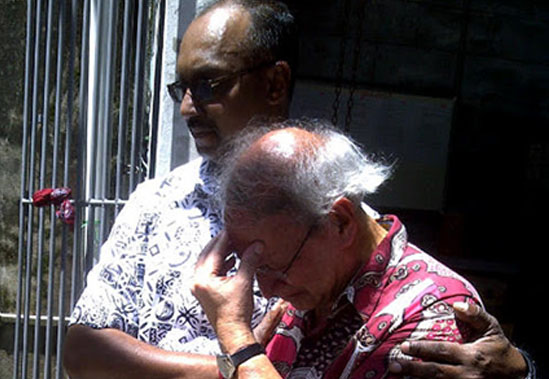
ANALYSIS: Fiji police have seized and burnt copies of the draft constitution despite military ruler Frank Bainimarama's pledge in his New Year's message that "we should have a new, modern constitution".
Under the draft, which has been obtained by The Australian, the president - a role widely believed to be attractive to Commodore Bainimarama, now Prime Minister - would be elected by parliament, sitting with a new national people's assembly that would meet for one week a year to consider new challenges to Fiji, to examine progress towards the constitutional goals, and chiefly to try to build national consensus.
The president would no longer be commander-in-chief of the army.
Commodore Bainimarama scored a coup last March by persuading internationally respected constitutional expert Professor Yash Ghai to chair a five-person commission to draw up a new constitution.
Hong Kong-based Professor Ghai, 73, was born in Kenya, became a barrister in Britain and has advised on constitutions in many countries, including Papua New Guinea, Kenya and Nepal.
His commission drew up a new constitution - which would be Fiji's fourth since independence from Britain in 1970 - following community consultations, including more than 7000 submissions.
This was presented last month to President Epeli Nailatikau, with copies provided for the Prime Minister and Solicitor-General. The Government Printer then produced 600 further copies that were seized by 12 police at the printery late last month.
Proofs shredded, burnt
Additional proof copies were burned. Professor Ghai said police shredded the commission's documents and set them on fire with kerosene. He said this showed contempt for the commission's work and for the people of Fiji.
A government decree under which the constitution has been drafted requires a constituent assembly to be established to debate publicly the draft and produce a document by the end of March.
The members of the assembly have yet to be announced. They will be appointed by Commodore Bainimarama, and it appears that his government is not pleased with elements of the draft.
Military Land Force Commander Lieutenant Colonel Mosese Tikoitoga said the commissioners "should be ashamed of themselves" for seeking to release the draft publicly.
He said: "The President doesn't need 600 copies, just one copy to view."
Professor Ghai, who was at the printery at the time of the raid, told Radio Australia he released the final draft because earlier versions had been "floating around", and he wished to ease confusion.
"We have tried to be as transparent as possible," he said.
Abused by police
He said he was abused by police as they seized the documents: "I felt not just a betrayal, but just felt, will Fiji ever have a democratic constitution?"
Under the draft, 60 of the 71 parliamentary seats would be for multi-member electoral districts, with the other 11 for parties, distributed proportionally. In an explanatory document, the constitutional commission said this "should do much to take the heat out of ethnic politics, encouraging political parties to broaden their appeal to all communities".
Commodore Bainimarama and the other leaders of the December 2006 coup would be provided immunity under the new constitution if they took an oath that "I renounce any actions in my past (and) I solemnly and sincerely submit myself to democracy and the rule of law".
The draft restricts the role of the military to being "responsible for the defence and protection of the country from external threats at the request of the government". It said people making submissions "frequently challenged (us) to produce a coup-free constitution".
The draft constitution stipulates freedom of the press, and rules out licensing "except for the need to regulate the use of radio frequencies, etc". Licensing "must not be controlled by government, political or commercial interests".
The draft requires the appointment by the president of a caretaker government before the first poll under the new constitution.
Meeting the Prime Minister's deadline of September next year would require him to step aside in about 15 months, unless he is invited to continue in power until the election.
Constitutional process 'integrity'
Sharon Smith-Johns, Fiji's Permanent secretary for Information, later said in a letter to The Australian that Callick's article was "factually incorrect".
She said no printed copies of Fiji's draft constitution had been burnt.
"All 599 copies were sequestered by police on the government's instruction when it learnt that the former chair of the constitutional commission, Professor Yash Ghai, was printing them contrary to law and planned to distribute them himself without the apparent knowledge of his fellow commissioners. The police action was to preserve the integrity of the constitutional process.
"The only things that were burnt were some shredded printer's proofs of the draft document, which the police destroyed for security reason," she said.
"The printed draft copies will be made available to the public when the assembly is convened. We requested Professor Ghai to observe due process and it is regrettable that he unilaterally took it upon himself to leak the draft document. The commission's work has ended and the next process will commence in due course."
Callick also reported the Australian government had welcomed the completion of the new draft constitution despite a bitter row between Professor Ghai and the Fiji military-backed government.
"The draft constitution is a substantial document and another step along the path towards Fiji's return to democracy,'' a spokeswoman for the Department of Foreign Affairs and Trade said.
Fijileaks copy of Fiji's draft constitution
Graham Davis commentary on Grubsheet



